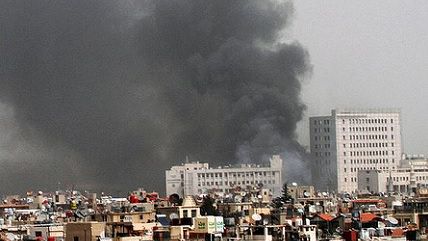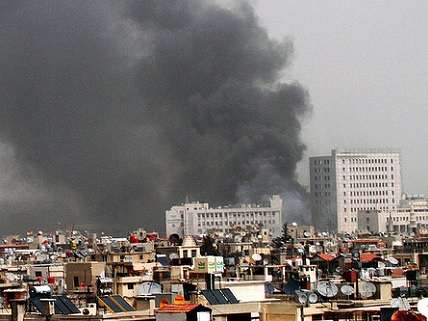Syria's Civil War an Increasingly International Affair
More folly?


A U.N. chemical weapons team is in Turkey to investigate claims that the regime in Syria has used chemical weapons in the civil war there. Syria and its ally Russia rejected those claims. Nevertheless the U.S. said earlier this month it had concluded Syria was using chemical weapons, using it to justify direct military aid publicly for the first time (John Kerry also wanted immediate air strikes). While interventionists claim they can ensure weapons don't go to rebels tied to extremist groups like the local Al-Qaeda affiliate, Jabhat Al-Nusra, the claim is highly dubious. The U.S. is still trying to secure weapons formerly of Col. Qaddafi's stockpiles that were looted during and after the U.S.-backed intervention into the Libyan civil war. In the aftermath of the civil war, the weapons made it to Mali and possibly as far as Lebanon and even Syria.
In the meantime, Russia has continued to supply its ally Syria with weapons and other aid throughout the conflict, including anti-aircraft missiles that could thwart a no-fly zone. Russia said it would not allow a no-fly zone over Syria, and could prevent any measure from passing the UN Security Council (which Obama and NATO used for authority on the Libyan no-fly zone, and which had imposed previous such zones in places like Iraq). NATO could go it alone but Russia would likely attempt to escalate in kind its involvement in the conflict. The Syrian regime is also backed by the anti-Israeli Hezbollah in Lebanon, which has spent much of its military resources in the Syrian civil war. Not unwelcome news to Israel, whose prime minister, Benjamin Netanyahu, has stayed away from backing any anti-Assad forces, preferring instead to launch airstrikes without acknowledging them in an effort to manage the conflict to Israel's perceived best interests. The conflict in Syria has also deteriorated the security situation in the contested Golan Heights border region,
Iran, a long time funder of Hezbollah, has also backed the Syrian regimes in other ways, with the United Kingdom (a loud advocate of Syrian rebels) accusing Iran of "propping up" the Assad government. Fellow European traveler in intervention, France, almost comically, said it was open to including Iran in peace talks on Syria. Peace talks without close regional allies like Iran are highly unlikely to induce any concessions from the Assad government. Those peace talks, anyway, don't look like they're going to happen, with pre-peace talk talks between Russia and the United States predictably falling apart, even as Russia effectively closed its Mediterranean naval outpost in Tartus by evacuating most of the personnel.
If this conflict is like the Balkans, as some interventionists like to declare, it feels a lot more like 1914 than the early 90s, and no American politician has been able to articulate any clear interest the U.S. might have in a proxy war in Syria.


Show Comments (16)